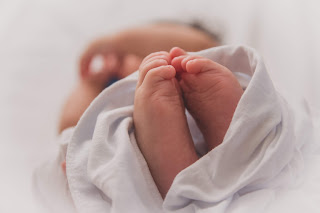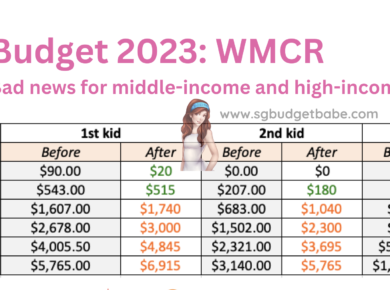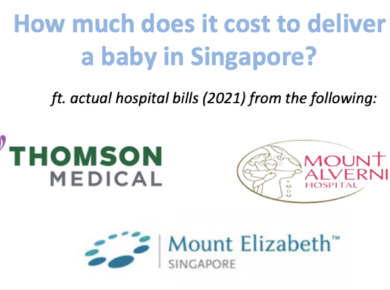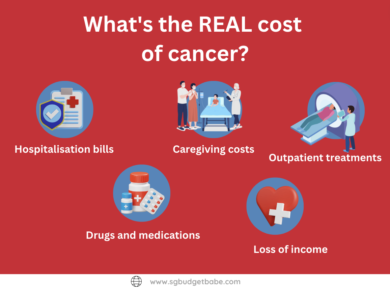How much should a couple have before having a baby?
While expenses differ between families (and your preferences), it is always a good idea to start saving up early while you’re trying for a baby, or the moment you find out you’re expecting, so that money will be the least of your worries after your baby is born because you’ll have so much more to worry about when that time comes!
My husband and I wanted to make sure we were adequately prepared, so we embarked on a journey and planned out what we wanted to get ready for before our baby arrives. Here’s what we did, and what I would recommend for new parents looking to to get their finances in order before your baby arrives:
1. Review your insurance policies
The first thing my husband and I did when we found out I was pregnant, was to get our family’s insurance policies in order. With higher expenses ahead, we made sure we were well covered for any unexpected incidents in life through our term and hospitalisation policies, as well as that of our parents.
Also consider if you need or wish to get maternity insurance. You can check out my comparison table here, where I studied 8 different policies while evaluating for my own pregnancy. Aviva is among the cheapest with one of the most extensive coverage – covering 10 pregnancy complications and 23 congenital conditions – and is the first insurer to offer developmental delay and stem cell transplant surgery on their maternity plan. I also like that there is no health check-up required for your baby if you purchase a whole life insurance plan for them within 90 days of their birth.
Review who your dependents are and make sure you look at their insurance coverage as well, and speak to a trusted financial advisor if you need guidance. Seek a second opinion if you need to. Make sure you do NOT end up overpaying for insurance at this point, but you gotta make sure all your basic safety nets are well covered!
2. Anticipate and save up for pregnancy + delivery costs
During your pregnancy, you’ll need to pay for gynae consultations, nutritional supplements, scans and various blood tests, so be prepared! On average, depending on the gynae you pick, you can expect to pay between $150 – $380 per visit. Some gynaes also offer packages in your fourth month onwards to help offset the consultation fees, so ask if that’s an option.
Delivery costs will largely depend on whether you go to a public or private hospital, as well as the method of birth. I’d say to prepare for emergency situations during labour, and to save up for a C-section operation even if you’re opting to go natural, because you’ll never know what could happen!
Cord blood banking is another potential cost you’d want to consider, which range from $5000 – $8000 for private storage.
In some cases, babies are born premature or might have to stay for an extended period of time in the NICU for jaundice or other treatments. Make sure you get a rough estimation of those costs, and save up accordingly.
My husband and I projected $20,000 for the pregnancy and delivery, so that’s how much we made sure to set aside.
3. Plan for post-delivery costs
Will you be hiring a confinement lady? If so, add another $3000 to your budget, and perhaps another $800 more for groceries. If not, will you be catering confinement food? That can cost another $1000. What about post-natal massages and herb baths? Prepare another $2000.
4. Plan for newborn hospitalisation and personal accident insurance
Get this settled within your baby’s first 30 – 60 days of birth especially if you’re already on a maternity insurance plan. The last thing you’ll want to deal with is a newborn who needs medical treatment but you’re left stark naked without any coverage. Other plans for your baby could include any of these top 5, which are commonly recommended and I’ve explained what they each cover here.
We are also intending to get a personal accident plan for our child as it is generally super affordable, and for less than $1 a day, the policy will cover stuff like insect bites, food poisoning, HFMD, dengue fever, Zika, measles and other infectious diseases.
5. Come up with your newborn essentials list and budget for it.
A baby crib, clothes, wash cloths, swaddle blankets, mittens, socks, plenty of diapers (newborns go through 8 a day), breastmilk bags, breast pads, nursing bras, breast pumps, formula milk, a car seat, etc… Have you gotten all of those prepared? To find the best deals and discounts, I like going to baby fairs and shopping online on sites like Qoo10 for group buys. Carousell is another great place to find new stuff that other mummies have stocked up extra on and no longer need. I’ve also consolidated a list of my favourite Taobao baby essentials here!
6. Plan for childcare
Who will take care of your baby while you’re out, or when you return to work after your maternity leave is over? Will you be hiring a domestic helper, or will the grandparents be able to help?
7. Choose a paediatrician and check that it is within your insurance coverage
Your newborn’s first visit will probably come sooner than you expect, so make sure you’ve already shortlisted a paediatrician in advance to save yourself the trouble and headache when the time comes. Also check with your insurance agent on how paediatrician fees will fall under your insurance network, and what can or cannot be covered.
8. Start tracking your expenses now (if you haven’t already done so)
Use a tracking app like Seedly, or pick from any of the free mobile apps that you like! It is crucial that you start tracking your expenses now so you can see where your money is going to and how much you’re spending, pre-baby. That way, when you continue this habit after baby has been born, it’ll be easier for you to compare and figure out how much to set aside regularly now that you have an additional life to care for.
 |
|
|
9. Build up your emergency fund!
As you can see, all of the above costs money, so you should probably start saving for it as soon as you can / find out you’re expecting!
My husband and I projected about $20k for pregnancy and delivery, and another $20k in the first year after baby is born. As such, we put aside a buffer fund of $50k to ensure we won’t be caught off-guard if anything happens.
Of course, that doesn’t mean that you need to save $50k before you have a baby! Every couple and family has different needs, so do go through the above 9 steps to determine what you need and how much it’ll cost you. Divide the total sum by 12 and start putting that amount aside every month. As a rough gauge, while there are many ways for you to cut down on expenses (just don’t forget the insurance!), I would say $30k for a couple going the private gynae and delivery route would be a safe amount to budget. That works out to be $2500 a month to save up, or about $1000+ per person (you and your spouse).
So start early, and you’ll be glad you did!
Sponsored message:
For readers who are keen to purchase Aviva’s MyMaternityPlan, which I’ve previously reviewed independently here against the other local plans and pointed out how they’re superior in a number of areas,
Sign up here for a free consultation to find out more!






